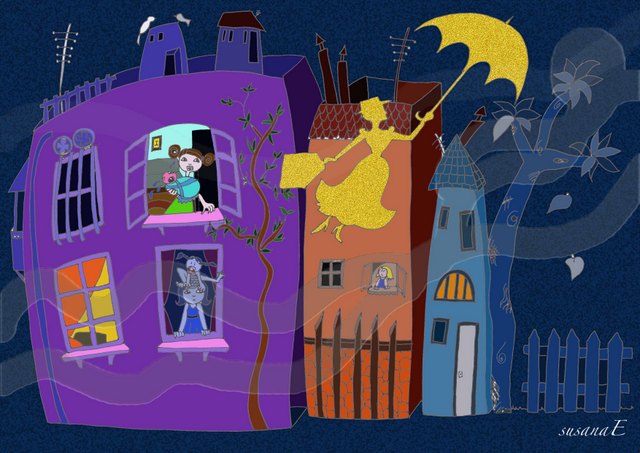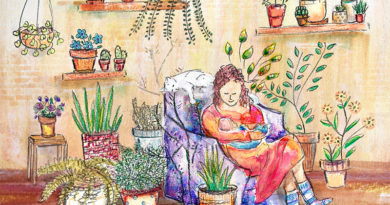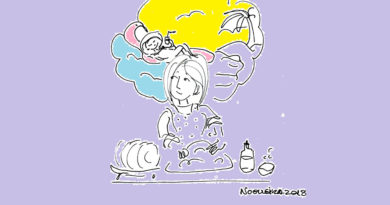The Culture Behind Motherhood
 Like most people, I have many opinions about motherhood – three kids’ worth, in fact – though that doesn’t mean I didn’t have thoughts on motherhood before kids. Regardless of the fact that there is nothing at all that can prepare you for the reality of it, there is one opinion that keeps on popping up in my mind like the flame of a trick candle on a birthday cake, and that is that kids should come with a nanny.
Like most people, I have many opinions about motherhood – three kids’ worth, in fact – though that doesn’t mean I didn’t have thoughts on motherhood before kids. Regardless of the fact that there is nothing at all that can prepare you for the reality of it, there is one opinion that keeps on popping up in my mind like the flame of a trick candle on a birthday cake, and that is that kids should come with a nanny.
Not that a nanny would change the roller coaster of emotions that surprise you like a fly that smacks against your uvula on a summer evening run. New feelings bring you to places you never even knew were there, and give new dimensions to the vocabulary of emotions you might have had in the past: fear for the fragility of this tiny being, fear that you’ll do everything wrong. The love that surges from places hitherto unknown, released by just a baby’s gurgle, followed by the pure dread at the sound of those hunger cries that force you out of bed during all hours of the night. A nanny can’t take care of that, but she could help with the sense of freedom lost. Going to the toilet or making a phone call, which had until then been a simple everyday course of action, became a task, stressful for both my baby and myself. Motherhood to me seemed like it changed every single aspect of what I had, until that point, known and lived. And when I say changed, I mean completely. I had to rethink and re-evaluate everything about how I had lived, including my relationships with people and time and everything around me.
Sadly, I had a bout of postnatal depression, mainly from exhaustion, because my first baby was born five weeks premature. He was tiny and needed so much help drinking. With the doctrine about the high value of Muttermilch (mother’s milk) ingrained in me, in my mind, I had no choice: I insisted on pumping my milk and warming it up to give it to him in a bottle, as he was too weak to nurse. The two-hour intervals followed by all the sterilizing didn’t leave a lot of time for rest. I would lie down, exhale an exhausted sigh, and before I could take another breath his cry would ring in the living room and he’d need to be fed all over again. Needless to say, it was too much. The moments when he chuckled and gurgled and I’d draw the curtains on his cot to be greeted by the most beautiful sunshiny smile, were a godsend – and they did keep me going – but a professional nanny at my side could have advised me and supported me during that impossible start.
In many parts of the world, having aid seems a natural and common phenomenon. When a woman has a baby, she inevitably needs help. Often a mother, grandmother and sometimes even female relatives or entire villages will be there for her. However, in many countries it is also understood as essential that a hired nanny will be around to take care of the new baby. In fact, when we lived in Lima, Peruvian friends of ours were horrified when we told them that back in Europe most people, including middle-class families, cannot afford a nanny, and that mothers were expected to handle the household along with babies alone most of the time.
That was many years ago and I was far from having my own kids. Now, living in Switzerland, I feel I have survived what I always referred to as my “donkey years,” what with all the nappies, bottles, snacks, wet-wipes, toys, and of course the books, to ensure an all-round happy and entertained baby (how differently I did things by the time I had my third child), times two. And that was just when I didn’t have to carry one of the children because they didn’t feel like walking back home or had hurt themselves. Lugging all of that up to the third floor after hiding the pram out of the neighbours’ way…and did I mention the shopping? Well who wouldn’t feel like a donkey? Indeed, I often remembered my Peruvian friends’ words and wished that things were different here.
But they’re not. Here, in Switzerland, I learned that it is highly valued to look after your own children and clean your own house, which I’m learning to understand (though I will never agree with it entirely). I still think it is equally valuable to aim for a balance between your own personal goals and fulfilling the family’s/children’s needs. My Swiss aunt once said to me that she believes it is important for women to experience this complete Aufopferung (self-sacrifice) in order to develop a healthy compassion. I’m not sure I will ever be able to agree with her. I’ve often wondered if that then makes me an egoist. Then I remember the advice given to me during my postnatal depression days, that “A happy mother is a good mother…not necessarily one that nurses at all costs, because she is told that it is healthiest – if it’s too much for her, well, that’s what baby formula is there for.” Once I finally understood this I actually slept a few hours at a time and could indeed start enjoying being with my baby.
It is this constant weighing up of expectations versus personal needs (wisdom and experience don’t really come into the equation until the “donkey years” are far behind) that I personally have found the most difficult, especially if these expectations go against your innate beliefs. These beliefs are of course also determined by cultural aspects, as are the expectations. The amount of advice that I received (mainly on the tram) as to how to dress my baby appropriately, as well as being “tut-tutted” for not having my four-year-old under control during a tantrum, often made me feel utterly inadequate. Equally frustrating were trips to the playground where sandpit bullies were left to run around, freely grabbing other kids’ buckets and spades without an adult intervening. When I joined an English-speaking Kindermusik (children’s music) group I finally came to realise that it wasn’t just me, the issue was a cultural one. Swiss mothers leave their children to fight things out. This is not necessarily the case for British or American parents. I had spent most of my formative years in an Anglo-Saxon environment and therefore had assumed a similar behavioural pattern. Again I realised that there is so much more to speaking a language. There is a cultural understanding that, growing up as an expat, I missed out on even though my parents are Swiss.
Having studied social anthropology, I find this very interesting. I would never have truly understood the innate value of culture if I hadn’t experienced it firsthand and as a mother. And it is at this point that I would like to mention that, to me, the most valuable experience of motherhood is precisely this change that it incorporates: change in its purest and most complete form. But this isn’t necessarily a bad thing. It is indeed the most difficult thing I have ever gone through (and probably will continue to do so, as I look at my friends’ teenage kids, with beads of sweat appearing on my forehead), but to me, it is also an opportunity for continuous self-reflection and self-determination. Be that as it may, I still think a healthy amount of self-realisation is a necessary part of the deal. And here a bit of childcare help would simplify matters substantially, in whatever country we may live or whichever culture we have grown up in.
By Karin Mohler
Karin Mohler has lived in between cultures for her entire life and has come to the conclusion that this will always be a big part of her. Having no roots doesn’t bind her anywhere in particular, but she is careful not to impose that sense upon her children, who have been born and bred in Switzerland. She has taken a lot of inspiration for understanding her “in-betweenness” from the book Third Culture Kids: Growing Up Among Worlds, by D. C. Pollock and R. v. Reken (2009).
Illustration by Susana Gutierrez
Susana is the mother of two little girls and a freelance illustrator. She can be reached at s.escapa@gmail.com.




Yes, your position in Switzerland is a complex one. On the one hand, you were raised with the Swiss language. But on the other hand, you did not grow up totally Swiss. You must find it interesting to watch your kids form their personalities based on one culture, rather than that of a Third Culture Kid (TCK). Or do you find that your kids are really TCKs because of your influence?
Hi Jean
I’m so sorry I just noticed your comments now – so first of all thank you for posting and – a Happy New Year!
I was in fact raised listening to my parents speaking Swiss but from the beginning my sisters and I were totally immersed in the English language, English schools and friends etc. and that usually in a non-english speaking country – so talk about the best of both worlds, or more like all worlds 🙂
I think this makes it hard to differentiate what comes from where and also where do certain types of behaviour/language etc belong. I think when it comes to my kids I have learned more about the Swiss way from them than the other way around. I don’t think that makes them TCK but I do think they are more aware of differences (not least because it’s often things I get annoyed about, I’m sorry to say) but of course also when we visit my sister in London I often perceive it as a sort of ‘coming home,’ moment for them when they can really understand what I meant because they can experience it.
I hope that answers your question?
Oh the “donkey years” – I very much like this description.
I really enjoyed reading your articles Karin. I too am a social anthropologist – and have just survived my first year in Switzerland with three small ones in tow. I hope last year was the hardest of my life!
And YES, I too would love a nanny, and wish every mother could have such support. But alas, what can we do but plod on through.
I find it especially hard here, as kindergarten starts so late. In New Zealand I would have all three children in school and kindergarten by now – but here I must wait another 18 months for that privilege. SIGH! 🙂
Thank you Rachael, it’s good to know I’m not the only one who sees it like that 😉
Though, I think it’s even harder for those of you who don’t have your family near you. I am very lucky to have my parents close by and my father is a very active Grandad, which is wonderful. But that’s not much help to you now is it?
How old are your children? Things have improved here, or at least I thought/hoped? they had, where childcare is concerned. I know in Basel there is a day care in the centre of town where you can leave the kids spontaneously when you want to go shopping or go for a coffee and sigh (or glare into space holding your coffee) by yourself for a few hours. I know most day care places require a minimum of 40% attendance, I believe, which does of course give you a certain amount of freedom (that’s what I did when mine were very little) but there are some that will take them for a day or an afternoon. It’s worth checking. Are you in Basel or Zuerich? Most people speak English as I’m sure you haven’t had much time to learn german or else I’d be happy to help and find out if you like. It can only get better! and it does. Really. 🙂